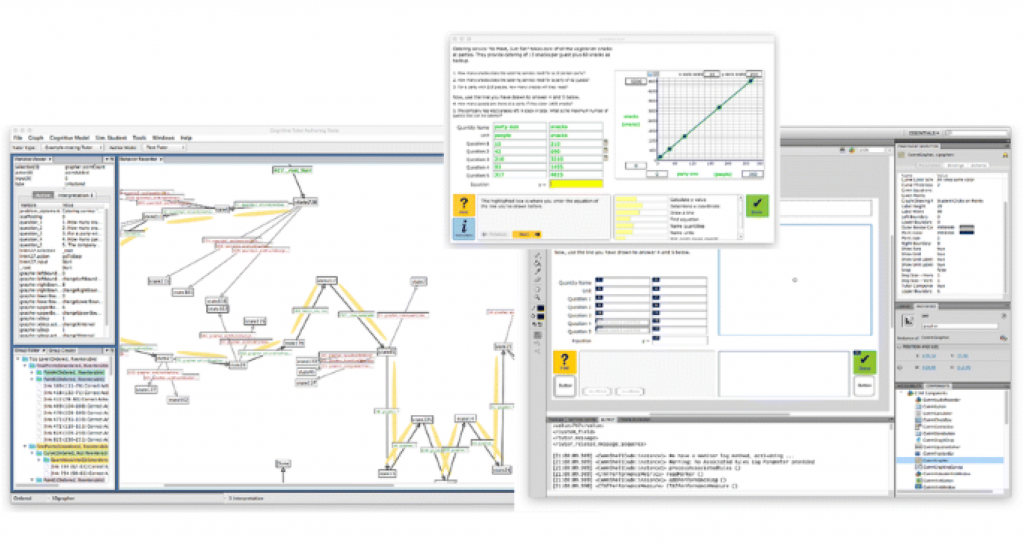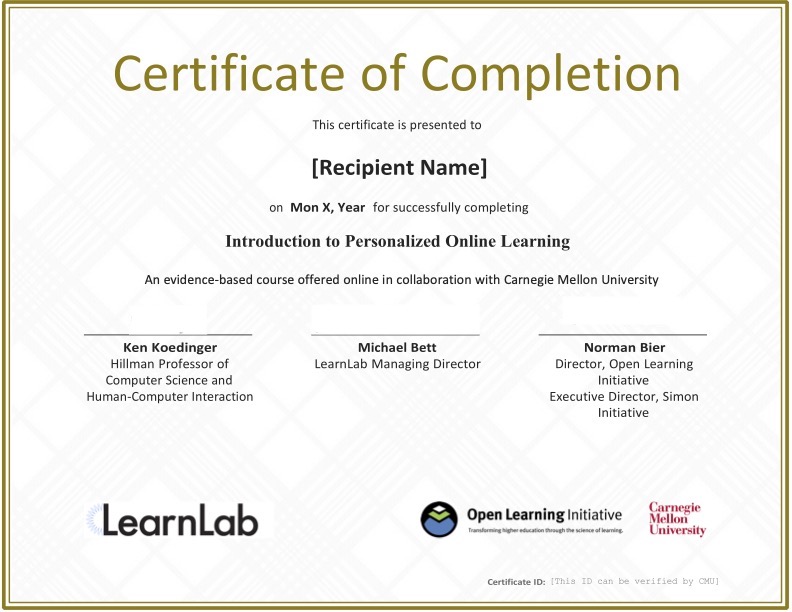Example-tracing Tutors: Intelligent Tutor Development for Non-programmers


Start Any Time
Work on your pace and you will have instructors available to help you answer any questions.

Duration
Approximately 2 weeks, 6-8 hours/week

Fee
$1000 - Professional Rate
$400 - Full-time Student Rate*
Referral & Group Discounts Available**
*Proof of full time student enrollment required. Acceptable forms of ID include a letter from your university’s registrar office or an unofficial transcript. Email your documents to learnlab-help@lists.andrew.cmu.edu.
**Have you taken one of our courses before? Refer a friend or colleague and get 20% off any future course – they’ll get 20% off a course of their choosing, too! Just have the person you refer email us at learnlab-help@lists.andrew.cmu.edu with your name and email address. Contact us about group discounts.
Certificate Course Description:
In this course, you will learn how to create a novel type of tutor called example-tracing tutors, that can be built without programming using the Cognitive Tutor Authoring Tools (CTAT). You will be able to create a tutor interface through drag-and-drop techniques and then demonstrate the problem-solving behaviors to be tutored.
Creating example-tracing tutors has been shown to be 4–8 times as cost-effective as estimates for ITS development from the literature. Since 2009, CTAT and its associated learning management system, the Tutorshop, have been extended and have been used for both research and real-world instruction. As evidence that example-tracing tutors are an effective and mature ITS paradigm, CTAT-built tutors have been used by approximately 44,000 students and account for 40% of the data sets in DataShop by 2016. These tutors support a variety of pedagogical approaches, beyond step-based problem solving, including collaborative learning, educational games, and guided invention activities. CTAT and other ITS authoring tools illustrate that non-programmer approaches to building ITS are viable and useful and will likely play a key role in making ITS widespread.
Our team hosts office hours for all courses over Zoom on the 2nd and 4th Wednesday of each month, 10:00 AM – 11:00 AM EDT/EST (4:00 PM – 5:00 PM CAT). On 2nd Wednesdays, Dr. Ken Koedinger, who is the Director of the Masters of Educational Technology and Applied Learning Sciences (METALS) program, will be available. On 4th Wednesdays, you will have the opportunity to speak with our learning engineers.
Module 1: Intelligent Tutor Design Principles
- Describe the most common instructional design principles for Cognitive Tutors
- Define ITS instructional features and design space as described by VanLehn
- Describe knowledge component modeling
Module 2: Example Tracing Basics
- Set up a CTAT development environment
- Use the HTML editor or coding to create a CTAT layout
- Use the behavior graph editor to create a solution/error path
- Explain the relation between using an example-tracing tutor and paths in a behavior graph
- Attach step-specific information to a behavior graph
- Use formulas in a behavior graph
- Assignment 1: Create an example-tracing tutor for dose calculation in veterinary medicine*
Module 3: Advanced Functions of Example Tracing
- Mass produce an example tracing tutor
- Deploy a CTAT tutor in an LMS
- Use the behavior graph editor to create a solution/error path
- Assignment 2: Extend your example-tracing tutor from Assignment 1 using advanced forms of ITS functionality*
Module 4: Course Project
At the end of the course, you’ll have an opportunity to do a little project in two stages. In first part, we will provide you feedback and help you choose a problem that is nuanced enough to take advantage of example-tracing capabilities and an estimate of time required. Then you will create an example-tracing tutor for the second part of your project targeting that problem and submit it along with a report.
That will provide you with a nice experience to apply the fundamentals you will learn in the modules to a larger, more authentic, context. It will be graded by the instructor and you will receive personalized feedback.
* Each assignment will be graded by the instructor and you will receive personalized feedback along with sample solution
None
Researchers, developers, product/UX designers, instructional designers, and teachers who want to create intelligent tutors. Anyone interested in edtech.
What you'll learn
This course will help you:
- Create example-tracing tutors using CTAT
- Apply the common instructional design principles and design space for creating cognitive tutors
- Scope problems suitable for creating intelligent tutors.
Course Instructors

Dr. Vincent Aleven
Dr. Vincent Aleven is a Professor in Carnegie Mellon’s Human-Computer Interaction Institute (HCII). He has 20 years of experience in research and development of advanced learning technologies, grounded in cognitive theory.
Certificate
Upon successful completion of the program, participants will receive a verified digital certificate of completion from Carnegie Mellon University’s Open Learning Initiative.

In addition to the knowledge and immediately applicable frameworks you will gain by attending your selected courses, you will benefit from:
- A digital, verified version of your Executive Certificate (Smart Certificate) you can add to your resume and LinkedIn
- Networking with a global group of your peers and instructors for advancing your career
Register Now
Register and start taking the course in two simple steps:
1. Enter your name and email address.
2. Register for the course at https://proton.oli.cmu.edu/sections/join/bv75u
Have questions? Our learning engineers are here to answer them at our monthly live AMA events! Join us at 4 PM EST on First Fridays, or 10 AM EST on Third Mondays. Registration required.